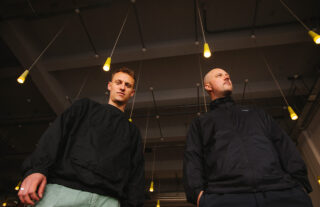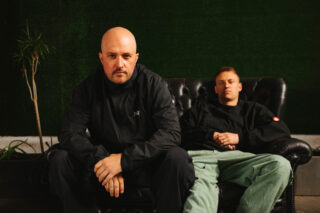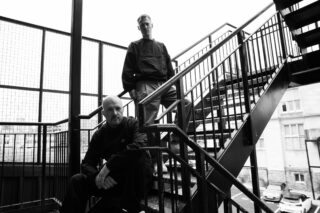Overmono: “It was fascinating to connect again with what was in the mainstream”
After a decade’s tireless work in the underground, the Russell brothers are ready to take their genre-blending club music up to the big time

After a decade’s tireless work in the underground, the Russell brothers are ready to take their genre-blending club music up to the big time
UK dance music has a thing for duos. From The Chemical Brothers to Bicep, something about a couple of fellas knocking heads behind some drum machines seems to rouse something in the collective consciousness. They break out of the sweaty clubs to conquer the airwaves, ravage festival crowds and soundtrack car adverts.
Why does it seem to be such a prevailing dynamic? Who’s to say? But one thing these acts certainly share is a knack for an accessible tune – an ability to create songs with enough club engineering to satisfy on any soundsystem, while universal enough to hum along to in the Co-op. It’s a delicate balance, and to achieve and maintain the level of artistic and commercial success is an impressive feat.
Overmono may well be the next act to join this lineage. Their debut album Good Lies is fast approaching, to be released via XL, home to many a household name in electronic music. It follows several years of steadily-gathering momentum, which has seen a release on tastemaker label AD93, several more on their own imprint Poly Kicks and an eclectic Fabric mix.
Overmono are brothers Tom and Ed Russell, known as Truss and Tessela respectively. Both brothers have been highly active on the UK club underground for the past decade, with careers as successful as they are intriguingly separate. Ed found ground in the post-dubstep landscape with his volleys of breakbeat-driven club artillery, most notably 2013’s ‘Hackney Parrot’, an undeniable classic of the era that led to the brothers forming the aforementioned Poly Kicks. “My goal was to try and write records that would stop people in their tracks,” recalls Ed, the younger of the two. “If you’re in a club and you’ve been listening to music all night, I wanted to write the records that would be the one thing you’d hear and be like, ‘What the fuck was that?’ Not even necessarily [based on] whether you liked it or not.”
Truss, on the other hand, was a more techno-focused project. “I was just known for doing big distorted kick drums,” says Tom wryly, before zeroing in the impetus of Overmono. “As much as I loved that sort of stuff, there’s only so much you can do with it really. It’s not the type of thing I want to do every single time I stand in the studio and it’s not the type of music I want to play every single weekend when I DJ.” Ed agrees: “I think we’d both reached the end of the road with what we’d been doing. We’re known individually for quite specific things, and if we veered outside of that people were sort of not interested. We had quite broad influences, and we felt like creatively we had way more that we wanted to try and get out.”
These growing frustrations led to the brothers setting up camp in a studio together for a few days with the sole purpose of having a mess about. With that came the closing of that collaborative gap between the brothers, and the forming of Overmono. The results from these early sessions formed the basis for their debut releases, a trilogy of EPs entitled Arla I-III released with XL across 2016 and 2017. They’re an eclectic sprawl of sketches that mirror the duo’s increased sense of creative freedom; a fizzy mixture of their own individual aesthetics and a signal of what was to come. “It’s not like we have some grand plan, you know,” Tom insists. “It was just a really natural thing. We went and made some music together without any preconceptions about what to make, what to do with it.”

For all the talk of not having a grand plan, the brothers acknowledge that the possibility of an album had been spoken about since those early EPs with XL. Good Lies follows on from strides made in recent years, releases that had begun to evoke the widescreen euphoria of the summer main stage, building upon elements of two-step garage, trance, breakbeats and techno.
The album began taking shape around 2021, with its title track sparking the direction of the record. “I remember when Ed sent over the demo,” recalls Tom. “Instantly I knew it was the core of the album. We used that as an anchor to write the rest of the album around.” The track itself is all pining synths and understatedly emotive vocals, atop a rolling breakbeat and 4×4 kick. It also flirts with organ house, with an intermittent M1 bassline pulling everything down from the clouds and toward the dancefloor. Fundamentally, it’s gesturing towards pure pop. I ask what it was about this direction that attracted them both.
“It was a bit more poppy than anything that we’ve done before,” Tom acknowledges. “I really liked the idea of exploring that a bit more. We always want to be pushing our sound forward, and that felt like a really exciting direction to explore.” The track ends with a beatless coda, a Burial-esque turn that mines the vocal of its inherent melancholia, compounding it with longing synths that crackle away into the distance. The same approach is taken on the decidedly more muscular ‘Arla Fearn’, though this time it’s the organ house lead that is left in the ambient soundscape, deliciously detuned and hopelessly lost in the world. It’s a feeling that echoes across the record, a sense of desperate yearning that is a key principle to a lot of pop songwriting, be it contemporary rap, R&B, oldschool trance or sugar-sick garage, all of which appear as reference points throughout the tracklisting. I wonder how these more openly emotional textures informed the creation of the overall record.
“We ended up listening to a lot of Radio 1,” says Ed.
“It was fascinating to connect again with what was in the mainstream,” adds Tom. “It was nice, because it was far removed from what we were doing in the studio. We started getting into a bit of US rap and stuff. There’s a lot of creativity, you could hear little bits every now and then – even songs that I don’t particularly like from an aesthetic point of view.”
I suggest that these disparate elements seem to have bled into the fabric of the album, especially on tracks like ‘Walk Thru Water’ and ‘Cold Blooded’. “I think we were inspired by a lot of those artists,” acknowledges Tom. “The fearlessness when it came to how their tracks would progress. It could be a four-minute track, starting at one point and then ending at a completely different point, but somehow it all makes sense. I really like that.”
“Then it all kind of gets looked through with the lens of all the shit that we’ve listened to growing up,” adds Ed.
There are also the obligatory two-step garage whompers that have gained the pair a significantly wider following over the past couple of years. This includes ‘So U Kno’, which was previously released as a 12” on the pair’s Poly Kicks label, and fan favourite ‘BMW Track’. The earworm vocal loop on ‘So U Kno’ makes it the kind of track that could be gratingly irritating if it wasn’t so proficiently executed, efficiently tuned for maximum effect. It’s no wonder that both tracks became some of the most unavoidable club fodder of 2021. Fellow album track ‘Is U’ follows the same genealogy; El-B drums, bulldozer subs, with an intriguingly janky vocal sample from Tirzah smeared across the top, though it builds further with arpeggiators and synth swells that are sure to guarantee peak festival season ecstasy. Elsewhere, ‘Vermonly’ offers a quieter moment that brings to mind the work of Bochum Welt, or Aphex Twin at his more pensive. It’s a subtle, yet evocative interlude, and one of several moments that reminds of the pair’s more left-field capabilities.
A near-constant fixture throughout the record’s varying moods and style is the use of sampled vocals. None of the voices on the record were recorded by the pair, instead they opted for late nights scouring the internet for suitable fragments. “It’s the sonic quality of samples,” answers Ed when I ask why they didn’t record any vocals themselves. “I think it’s the way you approach manipulating and treating them,” adds Tom. “Just from a mental point of view, it’s very different to if we’d had someone record a vocal that we’d written. It’s recontextualisation.”
I suggest that the vocals seem to become the focal point for the emotive thrust of many of the tracks; that particular sense of longing that lingers over much of the album. “One of the amazing benefits of sampling is that you’re able to express really big emotions,” says Ed. “Things which you wouldn’t feel confident enough to do yourself. Just a beautiful line or something. Maybe if you’d recorded it yourself, you might think think: ‘Is it too much?’
“But, I think in terms of longing, specifically, I don’t know…” he continues. “I just love a big synth that sounds like it’s crying.” Tom laughs in the background. “Like this synth, the Deckard’s Dream, which is a CS-80 clone, it just always sounds really drunk or sad…”
In many ways this sums up the brothers’ approach best – a fascination with sound creation, be it synthesis or sampling, an unending urge to explore, build, replicate and adapt. Of course, the song is the goal, but the process is vital too.

This joy of process extends beyond the studio; the pair consider their live show as the truest representation of the Overmono project. “We have quite defined roles,” explains Ed. “Tom does all the synths, anything musical. I do the drums and mangle a lot of the vocals.” Again, their treatment of vocals is broken down as an almost percussive element. “It’s just another instrument,” he clarifies. The show is constantly being tweaked as new music is made and additional equipment is acquired.
Interestingly enough, the live show harks back to another pre-Overmono experiment: “We’d started this pretty loose improvised techno thing called TR\\ER. It was all pretty chaotic at the best of times,” recalls Tom.
“We learnt a lot though,” adds Ed.
“Yeah that was a really big learning curve for us. Just the technical aspect of it, and the logistics of carting loads of kit around.”
“That shit’s really important to learn,” Ed agrees, reflecting on their current touring schedule. “You don’t want to expand without the consideration that you got to play live five or six times a weekend.”
The show has recently graced the deserts of Coachella, an experience that seems to have confirmed Overmono continued ascent on a global level. “I was ready to play to like 200 people,” admits Ed. “I’ve heard so many horror stories about English acts going over and playing in a big tent, and no one turns up. But we got there and it was rammed, and everyone knew the tunes.”
Perhaps it’s a sign of the times: a world where Skrillex, Four Tet and Fred Again can simultaneously whip Madison Square Gardens, Times Square and Coachella into a manic frenzy with one awkwardly-placed brostep tune.
“It definitely feels like there’s an appetite over there…” says Tom.
“The EDM bubble burst and I think we are only now starting to see where that’s led to…” considers Ed. “I think especially live electronic music in the States. If you can put on a show, they really get it.”
During their time in the States, they performed a few guest DJ sets for The Chemical Brothers, seasoned veterans of large-scale dance theatrics. “It’s super impressive, and pretty awe-inspiring, seeing what they’ve spent decades working towards,” says Tom.
I ask if they see a parallel between themselves and the potential career trajectory of someone like that.
“That’s the dream, right?” says Ed. “Yeah, that is the absolute dream. They’ve carved out their own world. Massive respect to them.”
I wonder if the brothers have felt the mounting weight of expectation that comes with all of this; the international live show, the increasing traction for their singles, and now, the impending release of an album with potentially huge commercial reach.
“I’m interested to see how it goes,” Ed responds nonchalantly. They do seem unfazed, but I question if they worry that the pressures they felt as young producers in the underground scene could surface ten-fold on a mainstream level.
“I’ll cross that bridge when I come to it. I’d love to have a big successful record though,” says Tom with a laugh. Ed interjects: “That kind of underground pressure that I guess you’re referring to, we didn’t have much of that when we started this project, compared to what we had before. I don’t think I’ve felt the weight of that pressure for a while anyway.”
Tom: “No, I haven’t either. When I was doing my solo stuff, the first thing that I’d always be thinking is, ‘What are my peers going to think of this?’ That would be a huge influence. And it wasn’t always positive on the way I’d approach making music. Then of course, ‘What are my fanbase, or whatever, gonna think of it?’ Now, I think as much as possible, when we get in the studio, we’re making music for ourselves.”
Underground dance heads can be the toughest critics, and a wider audience is surely a good thing if the creative impulse is unperturbed. The album will be the first thing many people will have heard by Overmono – and that’s before you consider how many listeners will be familiar with their previous decade of solo work.
“That’s a nice feeling, I think,” says Ed. “It’s great, because it feels like it’s just the start.”
It certainly could be the start, but it’s been a long journey already. I ask Tom how it feels doing all this with his younger sibling, someone whose passion he helped nurture from a young age, with music recommendations, production advice and general enthusiasm.
“It’s just so nice to have come all this way. Back then, I guess I was teaching him, but most of the time it’s him teaching me these days. I remember one year I bought him a copy of Reason [production software] for Christmas or his birthday. I remember saying to him at the time, ‘That’s an investment, consider that an investment.’”